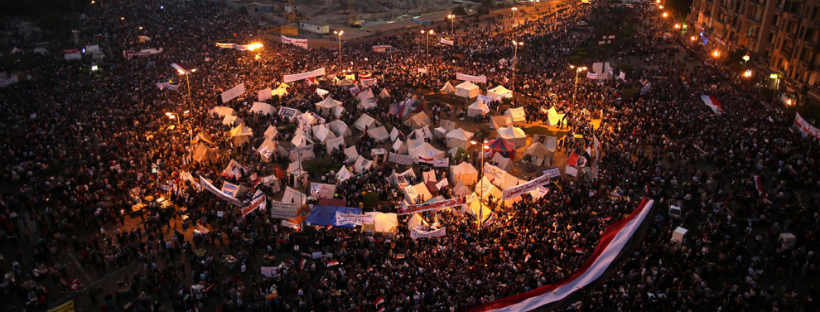Teaching the Revolutions
The Arab Spring — the popular uprisings across the Arab World that began in early 2011 — was the defining moment for a generation of Arabs, and was the seed of some of the most devastating, ongoing conflicts in the world today. However, it also produced some surprising and inspiring democratic successes. In addition to being an important moment in contemporary history, the Arab Spring combines topics that are interesting and important for middle and high school students to understand, like how governments work and how they fail, how young people can affect political change, and how many of contemporary conflicts that seem never-ending began.
Recommended Topics to Discuss
- Reasons for rebellion
- Timelines of the uprisings
- Who participated
- Methods of rebellion (i.e., social media strategizing)
- Aftermath: successes (i.e., Tunisia) and failures (i.e., Syria)
Background Information
- Country-by-country: these BBC profiles explain “What Happened?” and “Where are We Now?” for every country that experienced unrest during the uprisings
- Why the Arab World is Seething an early infographic from the New York Times into the causes of the Arab uprisings
- Arab Spring: an interactive timeline of the Middle East protests from The Guardian
- Arab Uprisings Bibliography from the Project on Middle East Political Science, a comprehensive guide to books and articles on the Arab Spring
Lesson Plans and Teaching Guides
- Arab Spring Mini-Unit and Assessment from the Pulitzer Center
- Exploring the Arab Spring through Hip-Hop from the Duke-UNC Consortium for Middle East Studies
- The Arab Spring: A Research and Study Guide from Cornell (teach your students how to conduct their own research and avoid biased sources!)
- Revolution in Tunisia lesson plan from the Pulitzer Center
- People, Power, and Pedagogies of Protest a five lesson unit and resource packet from the Columbia University Teachers College
- Tawakkol Karman: Women & Journalism in Yemen’s Arab Spring a lesson plan with primary resources focusing on the role of a Nobel Prize-winning journalist in Yemen’s Arab Spring uprisings
- The Arab Spring Monologues guides students to create their own play based on “Fractured Lands,” a New York Times narrative piece on the Arab Spring, from the Pulitzer Center
- Feminism in the Arab Spring Revolutions a PowerPoint from the National Council for the Social Studies
Films & Documentaries
- The Square the must-see documentary of the Arab Spring. It was shot during the early days of the protests in Egypt, and centers on the occupation of Tahrir Square in Cairo (free on Netflix)
- We Are The Giant in this powerful documentary, civilians in Egypt, Bahrain, Syria, and Libya face the decision to take up arms and fight for their liberty as their countries experience popular uprisings (for rent on Amazon Prime)
- The Trials of Spring portrays women in Egypt fighting to ensure that the popular uprisings include everyone (free with PBS membership – ask if your school has one)
- A Revolution in Four Seasons is a documentary following two women in post-revolution Tunisia, one of them secular and progressive, one an Islamist, fighting for their visions of Tunisia’s future (free on Youtube)
YouTube Videos
- Channel 4 News: The Arab Spring in 60 Seconds
- The History Channel: Here’s How the Arab Spring Started and How it Affected World History
- Al Jazeera’s Arab Spring playlist features a wealth of constantly updating videos covering every event, figure, and issue of the uprisings
- NBC News: Unrealized Dreams: Egypt After the Arab Spring
- AJ+: Social Media and Revolution in the Arab World
- Will You Support Egypt? A call for solidarity with Egypt released during the Arab Spring
- VICE News: The Revolt that Never Went Away – Bahrain: An Inconvenient Uprising
- AJ+: Tunisia: After the Revolution and the Arab Spring
- Omar Offendum’s #Syria was a call to action in rap form during the early Syrian uprisings, which got him banned from his home country
- Egyptian rapper Deeb talks about the role of hip-hop in the Arab Spring uprisings
- Reuters: Arab Spring – Opportunity or Disaster for Women?
Podcasts
- The Arab Spring Five Years On: Update on Tunisia, Turkey, and Egypt from Foreign Affairs Unedited
- The Egyptian Revolution from 15 Minute History (a UT Austin Project) examines Egypt’s transition to democratic rule and what comes next
- Arab Spring: A History is a 34-episode podcast series of deep dives on the different elements that contributed to the uprisings, from the colonial period to the Iraq War to the Israeli-Egypt relationship
- The Arab Spring – a premature celebration from Pod Academy discusses how the West got their early response to the revolutions wrong
Books
- Revolution for Dummies: Laughing Through the Arab Spring by Bassem Youssef is part memoir, part political analysis from a heart-surgeon-turned-satirist often called “Egypt’s Jon Stewart”
- Revolution is My Name by Mona Prince is a diary of the first eighteen days of the uprising in Egypt
- Cairo: My City, Our Revolution by Ahdaf Seouif is an in-depth narrative of the events leading up to Egypt’s Arab Spring, the protests themselves, and the immediate aftermath
- Diaries of an Unfinished Revolution: Voices from Tunis to Damascus edited by Matthew Cassel and Laila Al-Zubaidi is the rare collection of firsthand accounts of Arab Spring uprisings that doesn’t center Egypt
- The Queue by Basma Abdel Aziz is a dystopian novel about a grim, authoritarian society in a potential post-revolution Egypt
- Rebels by Accident by Patricia Dunn is a young adult novel about an Egyptian American teenager sent back to Cairo on the brink of the Arab Spring
- Rise: The Egyptian Revolution as Written Shortly Before it Began is an anthology of “Al Khan,” a political comic strip by Tarek Shahin was published in Daily News Egypt and shows how popular sentiment around Egyptian politics shifted and eventually led to protests.


